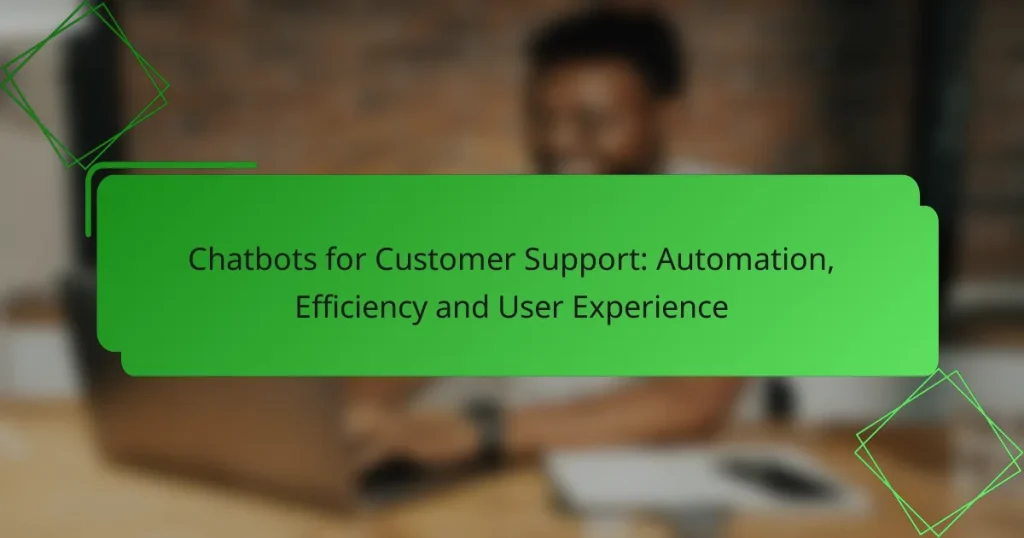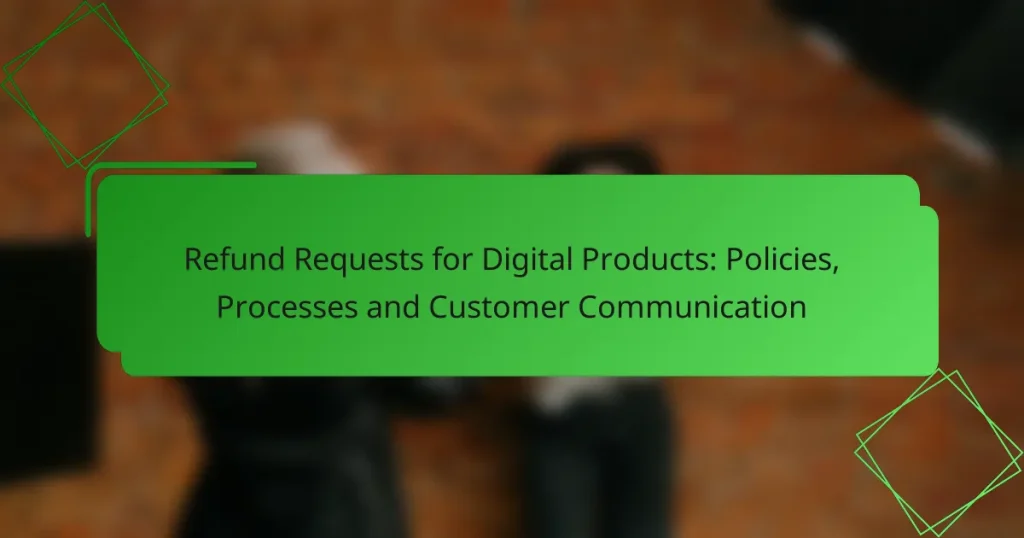In today’s digital landscape, effective customer support solutions are essential for enhancing user experiences and streamlining interactions. Tools such as live chat software, AI-powered chatbots, and help desk platforms offer unique features that cater to various aspects of customer engagement. By implementing these solutions, businesses can achieve faster response times and improve overall service quality.
Digital Products FAQs: Structure, Clarity and Accessibility
Customer Support for Digital Courses: Strategies, Tools and Engagement
Support Documentation for E-books: Clarity, Accessibility and User Guidance
Chatbots for Customer Support: Automation, Efficiency and User Experience
Refund Requests for Digital Products: Policies, Processes and Customer Communication
What are the best customer support solutions for digital products?
The best customer support solutions for digital products include live chat software, help desk platforms, AI-powered chatbots, customer relationship management (CRM) tools, and knowledge base systems. Each solution offers unique features that cater to different aspects of customer interaction and support efficiency.
Live chat software
Live chat software enables real-time communication between customers and support agents. This tool is essential for addressing immediate concerns and can significantly enhance customer satisfaction by providing quick responses.
When choosing live chat software, consider factors such as integration capabilities with your existing systems, ease of use, and analytics features. Popular options include Zendesk Chat and Intercom, which offer robust functionalities for managing customer inquiries.
Help desk platforms
Help desk platforms centralize customer support requests, allowing teams to track, manage, and resolve issues efficiently. These platforms often include ticketing systems, which help prioritize tasks based on urgency and customer impact.
Look for help desk solutions that offer automation features to streamline repetitive tasks. Tools like Freshdesk and Jira Service Management are widely used and provide comprehensive reporting options to monitor team performance.
AI-powered chatbots
AI-powered chatbots can handle a variety of customer inquiries without human intervention, providing 24/7 support. They are particularly useful for answering frequently asked questions and guiding users through basic troubleshooting steps.
When implementing chatbots, ensure they are trained on relevant data to improve accuracy. Platforms like Drift and Chatfuel allow businesses to create customized bots that can enhance user experience while reducing the workload on human agents.
Customer relationship management (CRM) tools
CRM tools help businesses manage customer interactions and data throughout the customer lifecycle. They provide insights into customer behavior, which can inform support strategies and improve service delivery.
Choose a CRM that integrates well with your other support solutions. Salesforce and HubSpot are popular choices that offer extensive features for tracking customer interactions and managing support tickets effectively.
Knowledge base systems
Knowledge base systems allow businesses to create a repository of articles, FAQs, and guides that customers can access for self-service support. This can reduce the volume of direct inquiries and empower customers to find solutions independently.
When developing a knowledge base, focus on clarity and organization. Tools like Helpjuice and Zendesk Guide provide templates and analytics to help you create effective self-service resources that meet customer needs.
How can digital products improve customer support?
Digital products enhance customer support by providing efficient tools that streamline processes and improve user experiences. These solutions facilitate faster response times, better communication, and a more personalized approach to customer interactions.
Streamlined communication channels
Digital products create streamlined communication channels that allow customers to reach support teams through various platforms such as chat, email, and social media. This omnichannel approach ensures that customers can choose their preferred method of contact, leading to higher satisfaction rates.
Implementing tools like live chat or chatbots can significantly reduce response times, often addressing customer inquiries within minutes. Additionally, integrating these channels into a single platform helps support teams manage interactions more effectively.
Automated ticketing systems
Automated ticketing systems help manage customer inquiries by categorizing and prioritizing requests without manual intervention. This automation allows support teams to focus on resolving issues rather than sorting through tickets, improving efficiency and response times.
Many systems provide features such as auto-acknowledgment of received tickets and status updates, which keep customers informed throughout the support process. Consider using a tiered system to prioritize urgent issues, ensuring that critical problems are addressed promptly.
Personalized customer interactions
Personalized customer interactions are made possible through data analytics and customer relationship management (CRM) tools. By analyzing customer behavior and preferences, support teams can tailor their responses and solutions, making customers feel valued and understood.
Utilizing customer data allows for proactive support, where teams can anticipate issues before they arise. Implementing personalization strategies, such as addressing customers by name and referencing past interactions, can significantly enhance the overall customer experience.
What are the key features of effective customer support solutions?
Effective customer support solutions typically include multi-channel support, analytics and reporting tools, and integration capabilities. These features ensure that businesses can address customer inquiries efficiently and improve overall service quality.
Multi-channel support
Multi-channel support allows customers to reach out through various platforms such as email, phone, live chat, and social media. This flexibility enhances customer satisfaction by providing options that suit their preferences.
When implementing multi-channel support, consider using a unified platform that consolidates interactions. This helps agents track conversations across channels, ensuring a seamless experience for customers.
Analytics and reporting tools
Analytics and reporting tools are essential for measuring the effectiveness of customer support efforts. These tools provide insights into response times, customer satisfaction scores, and common issues faced by customers.
Utilizing these analytics can help identify trends and areas for improvement. For example, if data shows that response times are longer during specific hours, businesses can adjust staffing accordingly to enhance service levels.
Integration capabilities
Integration capabilities enable customer support solutions to work seamlessly with other business systems, such as CRM and ticketing software. This connectivity allows for better data sharing and a more cohesive workflow.
When selecting a customer support solution, ensure it can integrate with existing tools. This reduces manual data entry and helps maintain accurate customer records, ultimately improving service efficiency and effectiveness.
What are the costs associated with customer support solutions?
The costs associated with customer support solutions can vary significantly based on the type of service, features, and the scale of implementation. Businesses should consider subscription fees, one-time setup costs, and potential expenses for additional features when budgeting for these solutions.
Subscription pricing models
Subscription pricing models typically charge businesses on a monthly or annual basis, providing access to customer support software and services. These fees can range from low monthly rates for basic plans to higher costs for premium features and support levels.
Common pricing tiers often include basic, standard, and enterprise options, with costs increasing as more advanced functionalities and user support are included. It’s essential to evaluate the specific needs of your business to select the most cost-effective plan.
One-time setup fees
One-time setup fees are charges incurred during the initial implementation of customer support solutions. These fees can cover configuration, integration with existing systems, and training for staff on how to use the new tools effectively.
Setup costs can vary widely, often ranging from a few hundred to several thousand dollars, depending on the complexity of the system and the level of customization required. Businesses should factor these costs into their overall budget when considering a new customer support solution.
Cost of additional features
Many customer support solutions offer additional features that can enhance functionality, such as advanced analytics, AI-driven chatbots, or multi-channel support. These features often come at an extra cost, which can be billed as a one-time fee or as part of a higher subscription tier.
When evaluating these costs, businesses should assess the potential return on investment from these features. Prioritizing features that align closely with customer needs can help ensure that additional expenditures lead to improved service and customer satisfaction.
What are the top customer support software for digital products in North America?
The leading customer support software for digital products in North America includes Zendesk, Freshdesk, and Intercom. These platforms offer various features tailored to enhance customer interactions, streamline support processes, and improve overall user satisfaction.
Zendesk
Zendesk is a widely used customer support solution that provides a comprehensive suite of tools for managing customer inquiries. It offers features such as ticketing systems, live chat, and a knowledge base, making it suitable for businesses of all sizes.
One key advantage of Zendesk is its scalability, allowing companies to customize their support experience as they grow. Pricing typically starts in the low hundreds of USD per month, depending on the features selected, making it accessible for small to large enterprises.
Freshdesk
Freshdesk is another popular choice, known for its user-friendly interface and robust functionality. It includes features like multi-channel support, automation tools, and reporting capabilities, which help teams manage customer interactions efficiently.
Freshdesk offers a free tier for small teams, with paid plans starting at around 15 USD per agent per month. This makes it an attractive option for startups and small businesses looking to enhance their customer support without a significant upfront investment.
Intercom
Intercom focuses on conversational support, enabling businesses to engage customers through messaging and chatbots. Its platform is designed to facilitate real-time communication, making it ideal for companies that prioritize immediate customer interaction.
Intercom’s pricing is generally higher, starting at several hundred USD per month, reflecting its advanced features like targeted messaging and user tracking. Businesses should consider their specific needs and customer engagement strategies when evaluating this option.





